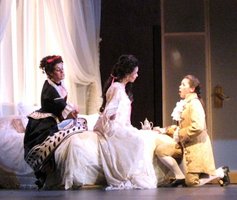May 26, 2006
Salvation by salmon
We Merkins are a devout lot. We remember our nation's dead in May, venerate fireworks in July, celebrate the arrival of a boatload of Yerpeen settlers in November. What we don't honor, strangely, is the first demonstration of nature's annual generosity: the salmon run.
(Helpless mankind, sacrificial fish. They've taken care of us for centuries, now it's our turn to take care of them. More on this soon.)
But if there's no official thanksgiving, there are plenty of opportunities these days to eat one's fill of Copper River Kings. Two such just last night.
At Flying Fish, razor clams, black cod, Copper River salmon
You'd think a dinner benefiting Long Live the Kings would go heavy on salmon, no? No. Instead, the repast at Flying Fish celebrated a wide range of northwest seafood: oysters, sweet razor clams, crab, black cod with the creamiest risotto imaginable, and, yes, finally, salmon. All of it local, all of it fresh. Wines from Chinook: wow! cabernet franc with salmon, what a great combination!
Two-thirds of a mile downstream, as the crow flies, eagle soars, or the salmon itself might migrate, at the water's edge on Pier 56, another celebration to give thanks for the salmon's return. Dominic reports from Elliott's Oyster House on Pier 56.
"Dinner here (four courses of salmon) is the cornerstone of Elliott's annual Salmon Gone Wild promotion, complete with "salmon-friendly" wines. The wineries are certified for using sustainable methods – organic farming, proper irrigation, avoiding silt runoff, etc. With different wines paired for all six courses it's clear what made the salmon go wild; by course and glass number five, so were we.
"Seafood's answer to a springtime Thanksgiving was discovered in a Mixed Salmon Brochette. Tender pieces of Copper River King nestled next to white salmon on a couple skewers. Chef Jeremy Anderson fortunately missed the memo that kabobs must be incinerated. These morsels were perfectly cooked, cradled by a bed of browned potato and hazelnut hash and circled by drizzles of Bing cherry and pomegranate reduction. It's too bad for the Pilgrims they didn't land in Seattle."
Too bad for the rest of us, too. Instead of a stupid, flightless buzzard, we'd have the wisest, noblest fish of all.
May 23, 2006
Something fishy this way swims
No, this isn't another review of Seattle Opera's Macbeth. And no, it's not about evil. Quite the contrary, in fact: it's Seattle's iconic wild salmon, swimming onto our plates just in time to rescue us from the long, dark winter.
Indeed, the concept of Redemption by Salmon is central to our civic religion, our Northwest Faith. We celebrate the Salmon: it dies for us, we eat it and are saved. In gratitude, we expend a fair measure of our riches to assure its immortality.
Okay, maybe that's layering a bit too much theology onto what is, after all, just dinner. Yet here's the irony: two of the city's leading seafood houses have scheduled celebratory salmon dinners on the same night: Thursday, May 25th.
They're not trying to outdo each other with claims of moral superiority, but one cannot help but wonder. Elliott's calls its $75 dinner Salmon Gone Wild, offering four courses of salmon (as carpaccio, fish cakes, gazpacho and mixed brochette). A few blocks away, the $100 event at Flying Fish benefits Long Live the Kings and saves its Copper River bullet for the finale (starting instead with clams, crab-stuffed crepe,and black cod). The two chefs agree on one thing: strawberries for dessert. Peace be with you.
Cornichon will attend both dinners. How? Ronald in Belltown, trusted associate Dominic on the waterfront. We'll let you know ...
Celebration of Seafood, Flying Fish, 2234 1st Ave., 206-728-8595
Salmon Gone Wild, Elliott's Oyster House, Pier 56, 206-623-4340
May 21, 2006
Getting fresh on the farm
Farmers and fishers turned out: Willie Green's Organic Farm, Taylor Shellfish, Lopez Island Farm, Skagit River Ranch, Full Circle Farm, Whistling Train Farm,, Fall City Farms
Restaurant and catering chefs turned out: Herban Feast Catering, Kaspar's, 35th Street Bistro, Bon Appetit Management Co., Flying Fish.
Serious foodies turned out, too, most notably author and farmer Michael Ableman, who read from his new book, Fields of Plenty.
This was dinner at Fall City Farms in the shadow of Mount Si, a fundraiser for the Cascade Harvest Coalition. Reassuringly familiar phrases were spoken: sustainable agriculture, family farms, bridging the gap between urban and rural, connecting eater and farmer, one fork at a time.
And Ableman, who tended a 12-acre near Santa Barbara for 17 years ("I just wanted to grow the best tomatoes") now describes farming as "one big orgy." Applause from the well-fed crowd. Where do you stand? Oh, sure, agriculture is all about reproduction, but does that mean food is sex? Is the act of eating intimate? Or is it, rather, political?
May 19, 2006
The man who would be Editor
Little did Jerry Baldwin, Ziv Siegl and Gordon Bowker expect, when they sold their modestly successful coffee company to the determined guy they'd once hired to do their marketing, that he'd turn Starbucks into the world's most frequented brand.
And yet, and yet. Not satisfied with the company's phenomenal growth, Howard Schultz wants to be even more than America's top caffeine pusher, he wants to be our cultural pimp, too. His grand ambition is all over a story on the front page of USA Today: he literally sees Starbucks as the "editor" of American popular culture.

A culture czar? Heaven forfend! We've already got Oprah, Martha, Paris, Ellen and Hilary, not to mention Jon, Rush, the George-Dick-Don-Karl Quartet, and the whole Fox gang. Get in line with the rest of the wannabes, Howard.
"One of the great strengths of Starbucks is our humility," he tells USAT with a straight face, but it's still a naked power grab.
Sure, Starbucks has taught us to drink better coffee, but it's also conditioned us to pay $5 for what used to cost a buck.
Sure, Starbucks supports Fair Trade coffee growers in third-world countries, but it's also selling obscene amounts of calorie-laden drinks and snacks to its own customers.
Sure, Starbucks is turning its stores into comfortable neighborhood magnets, but it's a slippery slope. Once Howard decides he knows what's best for us (uplifting movies like Akeelah and the Bee, CDs by Tony Bennett), who knows what's next? Edsels? New Coke? Koolaid?
May 18, 2006
The cherub of Meany Hall
Her name is Tess Altiveros and, in the current UW production of Mozart's Le Nozze di Figaro (jointly staged by the Schools of Music and Drama), she plays the mezzo-soprano "pants role" of the love-struck pageboy, Cherubino. The operatic convention of an adult woman portraying an adolescent male makes musical sense; there's no better practitioner than the beloved Frederica Von Stade, who brings a golden voice and a winsome sprightliness to her art.


Tess Altiveros as girl-crazy Cherubino in the UW's "Marriage of Figaro."
Miss Altiveros enlivens the first half of this Figaro with two brilliant arias about a teenager's hapless, hopeless preoccupation with the opposite sex. First, in "Non so piu" Cherubino explains that he's turned on by every female he sees. Then, in Voi che sapete, he asks the universal question, "What is love?" Miss Altiveros makes the awkward lad's singlemindedness and befuddlement heartbreakingly credible.
She's been studying toward a degree in vocal performance with tenor Vinson Cole; in the meantime, she's sung at Town Hall and is the resident soprano soloist at Trinity Episcopal Church's Cascadian Chorale. Not bad for a singer who's still in college. One to watch.
Two performances to go, Friday night and Sunday afternoon, and do go. The $20 ticket price at Meany is a fraction of what you'd pay at McCaw, provides at least as much pleasure, and does far more to nurture the future of classical opera. More on the production below.
Le Nozze de Figaro, Meany Hall, May 19th & 21st. 206-543-4880
It all starts with Beaumarchais, the French social satirist. His tales of a street-wise barber named Figaro spawned an opera by Rossini, The Barber of Seville (in which Figaro arranges for Count Almaviva to marry Rosina) and another by Mozart, The Marriage of Figaro (in which Almaviva, by now bored with Rosina, lusts for Figaro's fiancee Susanna). The notion that a wily servant like Figaro would challenge his master's authority was considered revolutionary; for a time, French court censors banned performances of the Beaumarchais plays.
Mozart had to tone down the play's incendiary politics (which seem quaint today) in favor of its emotional impact, which puts Countess Almaviva's despair at being neglected by her husband at the heart of the opera. In Cosi Fan Tutte, the men demonstrate that all women are "like that," fickle. In this case, it's the women, the Countess and Susanna, who humiliate the philandering Count before letting him off the hook.
No such forgiveness, the following year, for the title character of Mozart's next opera, Don Giovanni; he gets consumed by the flames of hell. Indeed, within a matter of months, the Bastille was stormed and the French Revolution was underway.
May 17, 2006
Making good
More attention should have been paid to the James Beard awards this year. After three nominations, Scott Carsberg of Lampreia finally won as "Best Chef, Northwest." Backhanded compliment for this modest craftsman: they misspelled the restaurant's name on the website. Sheesh! Then again, most winners have, at some point, cooked a benefit dinner at James Beard House; not Scott. Nor did he attend the awards banquet; it's not his thing. What is his thing? Ah, that would be his meticulously composed tasting menu, the pride of Belltown.




Lampreia's Carsberg, Macrina's cupcake, oyster-guru Rowley, cocktail-guru Hess.
Scott's next-door neighbor, Leslie Mackie of Macrina Bakery, was nominated as "Best Pastry Chef." The Stranger's Sara Dickerman won a food-writing award for her work on Slate.com. Altogether, good haul for Seattle.
And while we're at it, the New York Times has a fine article (free registration required) by Johnny Apple today on Salumi, calling Armandino Batali's culatello the best ham America. Cornichon wrote about Salumi a couple of years ago; here's a look at:the archived photo album.
Couple of weeks back, Apple wrote a wonderful piece about Olympia oysters and the fellow who single-handedly brought them back from the brink of extinction: Jon Rowley. Slurp!
Finally, the current issue of Esquire, featuring "The Best Bars in America." Whew! They didn't ignore Seattle's best, the ZigZag Cafe. Recommends the Deshler: Dubonnet, rye, Cointreau, bitters. Turns out their Northwest correspondent was local cocktail guru Robert Hess. Cheers!
Lampreia, 2400 First Ave., 206-443-3301
May 8, 2006
Double toil, double trouble
Vocal highlight of Verdi's stirring Macbeth at Seattle Opera Saturday night was probably Macduff's anguished lament when he finds his family slain by the evil tyrant, a show-stopping tenor aria in this dark, brooding opera. Many-layered staging of 11th century Scottish history by 17th century English bard, set to music by 19th century Italian composer, designed by 21st century LA architect Robert Israel [please, God, save us from smug, didactic architects!] and directed by [uh-oh] Frenchman Bernard Uzan. Such insufferable scolds, those Frenchies. Sometimes, when they're telling us what to eat [foie gras] or what to do [Iraq], they're right on the money; other times [think Jerry Lewis, Bernard Henri-Levy], maybe not. Call Saturday's unfocused scenes and bizarre witches a mixed verdict.


Saturday night: uncertain. Sunday matinee: Gordon Hawkins saves Macbeth. Whew!
By Sunday afternoon, a different story. We walk in right behind Gordon Hawkins, the Gold Cast Macbeth, tall & imposing in street clothes. Me, I sidle up & say, "Gee, looks like you just can't stay away, can you?" Modest & polite, he answers, "Hey, I'm here to support my colleagues." We take our seats, side-by-side in Row N, house lights dim, & settle in for Silver Cast.
Soprano Elena Zelenskaya's Lady Macbeth in fine voice, overshadows baritone Louis Otey; by the end of second act, Otey is literally down for the count. [Official term is "indisposed."] Is there, by any chance, another baritone in the house who knows the role? As if.
Consummate trouper, our erstwhile seatmate returns to the stage and wows the house with a performance surpassing previous evening's triumph. Fair enough, following tradition, one artist falls ill, another steps into the breach. Yet that, my friends, is the reason we go to the theater. Not for the perverse anticipation of NASCAR train-wrecks but for the surprise and vitality of live performance.
In the end, it comes down to the unique privilege of the moment: the drama, the music, the great hall, the singers, the set, scenery, costumes, light, all this is for you and only you, now and only now.
Seattle Opera presents Verdi's Macbeth through May 20th. 206-389-7676
Note: this post also appeared briefly on Seattlest.com; it's since been supplanted by their regular opera writer's more traditional review. Other reviews: Seattle Times, Seattle P-I. More from me below.
Was going to draw comparison between Macbeth's murderous plots and current politics. "Blood will have blood," right? Too belabored. Basic difficulty: Macbeth plagued by self-awareness; Lady Macbeth simply too self-absorbed. No such signs among today's ruling class-action defendant, Cheynsfeld & Co. ["The road to power is paved with evil deeds."] Simply can't imagine Lady Laura complaining about una macchia ["Out, damned spot!"] unless it's a botched espresso macchiato at Starbucks. Oh, sure, we can find a few witch-like Foxes: Coulter & friends; there's even a role for Condi ["rhymes with witch"] as an alternate-cast Lady Macbeth ["The ultimate pleasure is power."] But the evil Scotsman himself is too plagued with doubt to morph into a clueless, dimwitted modern MacGeorge, no matter how hard we might wish it. On the other hand, one could imagine a whole Ring cycle about Prince KerriGore and a supporting trio of furies: Lady Hilary, Lady Tipper and Lady Theresa. But that's another post.
May 3, 2006
Center of the cocktail universe
It's all about the gin, the vermouth, the garnish, the size of the glass, even the temperature of the ice. The folks who know are here in Seattle. Four cocktail luminaries on the dais at the Mayflower Park Hotel: from New York, authors Anistatia Miller and Jared Brown (Shaken, Not Stirred), local guru Robert Hess (drinkboy.com), and celebrity bartender Ryan Magarian. Two dozen people in the audience for a seminar on martinis.


Anistatia Miller and Robert Hess prepare martinis at Mayflower
Surprise number one: the first martini was half gin, half sweet vermouth, with a dash of orange bitters. Botanical elements of vermouth deemed crucial. (In fact, Julia Child drank "reverse martinis," 5 parts white vermouth to 1 part gin. "The perfect drink for swordfish," says Jared.) Order a martini today and all you're likely to get is a giant glass of cold gin (or vodka).
Those sexy, oversize martini glasses? Bah. A cocktail should be of modest size. "It's a 5-minute thing. Drink it while it's still laughing at you," says Anistatia.
There's no consensus among the experts on the "shaken or stirred" question, except that melting ice adds water--a good thing. They also agree that the martini is first and foremost a cocktail, a culinary creation worthy of prime ingredients. "Use fresh vermouth!" says Anistatia. "Measure your ingredients, use fresh ice, pay attention to garnishes," says Robert. "Drink one glass of water per cocktail," says Ryan.
Inevitably, the question turns to "best" spirits. "Do blind tastings," recommends Ryan. For gin martinis, they agree on Plymouth (for its floral edge), though Tanqueray (very dry with notes of lime) is ideal for gin & tonic. Vodka: Ketel One, but Anistatia and Jared have their own award-winning brand, Heavy Water, that's about to go into expanded production. .
"Seattle is a great cocktail town," says Jared. "We say so in our book," says Anistatia. "So's Portland," says Robert.
Related calendar items:
* On May 13th the Museum of the American Cocktail celebrates the 200th anniversary of the first mention of a "cocktail." Kirkland bartender Brandon Williams is among the contestants for best new concoction. Commander's Palace, Las Vegas.
* On June 29th Oliver's, the Mayflower Park's bar and 7-time winner of "Seattle's Best Classic Martini," celebrates its 30th anniversary. Cheers!
May 2, 2006
Wines for sunny days
Sun's out, no time for cynical, snarky stuff. Go forth and enjoy. Enjoy the Banfi Rosa Regale at Cascadia, a sweet, fragrant sparkler (Brachetto grapes) that makes a great accompaniment to summer desserts. Go forth and buy as much of the Arroyo Joven as your cellar can handle; a yummy Spanish red (Tinta del Pais grapes) that's only $7 a bottle, half-off, at Seattle Wine Outlet.
Flutes at Cascadia, floor stack at Seattle Wine Outlet, Vin du Lac whites.
And while you're at it, check out Lisa Pettit's playful new labels for Vin du Lac over on Lake Chelan. You won't have any trouble spotting these on the shelf, and you don't have to worry that the neighbors will think you're some sort of wine snob when you bring a couple of bottles to the picnic. Kudos, kudos!
May 1, 2006
Now, what's for lunch?
Roast suckling pig under heat lamp in Seattle; dressing fattened goose on a farm in France.
Pity the parsnip. Artificially germinated, forced to sprout in a furrow, nurtured (if you can call it that) in a bed of manure, raised with indifference, virtually ignored until it reaches market weight. Then it's thoughtlessly deracinated, mechanically decapitated, mercilessly skinned, and, in a final act of stultifying callousness, boiled alive.
Fruit and veg of other species fare no better. Corn is stripped from its parental cob. Parsley is hacked to death. Spinach is chopped and creamed, potatoes routinely whipped, pumpkins eviscerated, grain thrashed and flailed. Who's there to coddle and console a carrot? Provide foster-care for an orphaned banana? Instead, there's jubilation when cherries are doused in alcohol and set afire.
Think about this: by "harvesting" a string bean, we're kidnapping the plant's children. What does it do to our humanity, when, three times a day, we kill vegetables just to feed our voracious animal appetites?
Cruelty to vegetables is a serious concern, hidden from view because farming and gardening appear to be so natural, and questioning "nature's way" isn't politically correct. But lower taxes on farmland means higher taxes for the rest of our property. Plants require a lot of water, and water's not cheap.
Look it up: I'll bet farmers use more than their share of sunlight, too.




